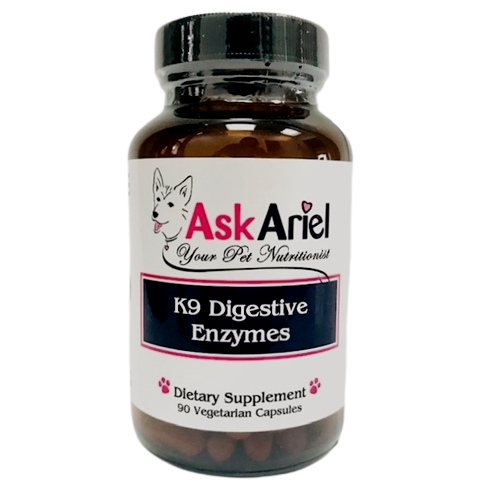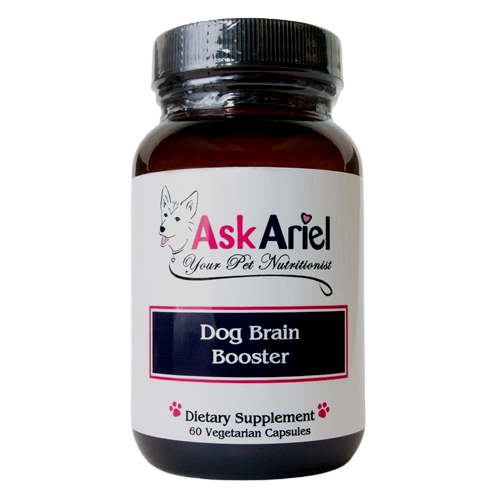Natural Remedies and Vitamins for Dogs With Seizures
 Legend Has Been Seizure-Free Since 2017
Legend Has Been Seizure-Free Since 2017
Has your dog experienced a seizure? Been diagnosed with epilepsy? Having a dog with epilepsy may be one of the most emotionally difficult challenges a pet owner can face. Witnessing the violent movements of a dog having a seizure may be too painful for some pet parents to endure. Sadly, it’s not uncommon for pet owners to put their dog down upon receiving the diagnosis. There are many canine epilepsy success stories, and there is hope! Contrary to popular misconceptions, seizure dogs can lead happy and healthy lives!
Symptoms of seizures in dogs vary depending upon the type of seizure that occurs. Some dogs may experience twitching or shaking, while others become unconscious with full convulsions lasting for what seems like forever but may only be a minute or so. There are different types of seizures, such as grand mal seizures, focal seizures and cluster seizures. During a grand mal seizure, dogs can collapse on the ground, urinate and defecate involuntarily, froth at the mouth and paddle about. While veterinarians and pet parents may have differing opinions on how best to care for a dog with seizures, there is one thing everyone can agree on: Once you have seen your beloved dog have an epileptic seizure, you never want to see another one.
While watching your dog have a seizure can be traumatic, there is hope for both you and your pet. Our personal journey to help our rescue dog Legend manage his seizures can be seen below. Similarly, there are hundreds of other seizure dogs that we have had the privilege of helping since Ask Ariel began in 2005. There isn’t a magical supplement to stop dog seizures, and it’s important to know that anti-seizure medications are not a cure-all either. But from our experience, what seems to work best is a combination of conventional and holistic treatments for dogs with seizures. Here are our best vitamins for epilepsy in dogs and tips for limiting the frequency and duration of dog seizures.
Natural Treatments for Seizures in Dogs
 8 Tips for Controlling Dog Seizures
8 Tips for Controlling Dog Seizures
1. Seek Out the Help of a Neurologist
When a dog has its first epileptic seizure, depending upon the age and other health issues affecting the dog, most commonly the next step is a “wait and see” approach. Some dogs may never have another seizure. Some dogs may have another seizure a week later. Every dog is different. However, if your dog has a couple of seizures in a relatively short period of time or experiences cluster seizures (either several seizures one after another in the same episode or several seizures closely timed over a few days), then it’s a good idea to seek out the advice of a neurologist. Why? Veterinary neurologists will see more seizure patients than a regular veterinarian and will have more experience and knowledge on how best to treat your pup. This does not mean you should rush and put your pet through stressful and expensive testing such as MRIs and spinal taps unless absolutely necessary. You can have an exploratory discussion with a neurologist just to learn what your treatment options are.
2. Look for the Triggers of the Seizures
What can trigger a seizure in a dog? There are many things that can trigger your dog’s seizures. Causes of seizures in dogs can range from idiopathic epilepsy (inherited - no known cause), ingestion of toxins, liver and kidney failure, low blood sugar, brain trauma and brain tumors. Idiopathic epilepsy is the most common cause of seizures in dogs and can occur when there are changes in brain activity, such as when the dog is waking up or excited; however, there can be many other triggers that cause seizures in dogs. Knowing what can trigger a seizure in a dog can often reduce the frequency of seizures. Be sure to document each time your dog has a seizure and try to identify any factors that were different or unusual. Diet can be a HUGE trigger. What did your dog eat? Were there workmen at the house? Was your dog left alone longer than usual? Was it fed later than usual? Were there kids playing or loud music or cleaning products used? Stress, both physical and emotional, can trigger seizures.
3. Work With Your Veterinarian To Determine if Other Health Conditions or Age-Related Issues May Be a Factor
Health conditions such as brain tumors, hypothyroidism or advanced liver or kidney disease can cause seizures. Having your dog thoroughly checked for other health issues is important. Age is also a factor. A dog may have an occasional seizure as a young pup but then develop more frequent seizures as an adult dog.
4. Feed a Hypoallergenic Canine Epilepsy Diet
Food allergens can cause stress on your pet’s health, and grains can be pro-inflammatory. Ideally, a canine epilepsy diet should include fresh ingredients such as vegetables and be low in carbohydrates. Many dogs improve by avoiding common allergens such as soy and poultry, grains, chemical additives and food colorings (found in many treats). A homemade or raw frozen commercial diet can be helpful. Please include your dog’s diet and treats on the order form at checkout, and we will provide diet tips on the packing slip that comes with your product directions.

5. Use Ask Ariel’s Natural Supplements To Support Your Dog’s Health
Whether you try to control your dog’s seizures without medication or use antiepileptic drugs, supplements are an essential part of a seizure dog’s care. According to the AKC, between 20 and 30% of dogs taking antiepileptic medications still experience seizures, and some dogs do not respond effectively to conventional medication at all. This is where natural anti-seizure supplements for dogs can help your pet immensely. Your dog may experience an occasional breakthrough seizure, or the seizures may be a regular occurrence after a certain period of time (e.g., every month or so). Natural remedies for dog seizures can help your dog’s anxiety and stress levels (many seizure dogs have anxiety and/or separation anxiety). Dog digestive supplements such as enzymes and probiotics are essential because digestive issues, intestinal dysbiosis and alterations in intestinal bacteria (currently being researched) may affect seizure activity.
 Happy Paws Organic Hemp Extract for Dogs Happy Paws Organic Hemp Extract for Dogs - There is promising research on the use of CBD in the treatment of dogs with seizures. A recent pilot study at Colorado State University found that 89% of dogs that received CBD in the clinical trial had a reduction in the frequency of seizures.* This is consistent with scientific studies on human seizure patients as well. But not all CBD is the same, and the amount used needs to be properly controlled. More is not necessarily better, and many forms of pet CBD contain THC (which can have an adverse side effect on seizure dogs) or contain chemicals and pesticides. Ask Ariel carefully researched our professional veterinary strength Hemp Extract, which is made in the USA, is 100% organic and has been used successfully by many seizure patients, including our very own Legend (story below).
*Reference: Journal of the American Veterinary Association. June 1, 2019.
Amazing Omegas - Amazing Omegas contains the highest-quality fish oil packed in specialty glass bottles to maintain freshness and purity. Amazing Omegas is the best fish oil for dogs! The quality and purity just can’t be compared. Amazing Omegas is naturally processed, third-party tested to ensure our omega-3 supplement is free of toxins and heavy metals (including mercury and PCBs), and concentrated to provide a highly therapeutic dose from a small amount of oil. Omega-3 fatty acids have been scientifically shown to be helpful for brain health. For example, docosahexaenoic acid (DHA) improves cognitive function. When searching for home remedies for dog seizures, be sure to include our Amazing Omegas.
 K9 Digestive Enzymes K9 Digestive Enzymes - Scientific researchers are studying the important connection between the gut and the brain, referred to as the “gut-brain axis.” The gut microbiome includes hundreds of species of bacteria and is now recognized as an important part of animal health. A healthy gut microbiome can affect brain function and may in fact affect seizure activity. Just as migraine headaches in humans may be affected by digestion and food intolerances, seizures in pets may be affected by a dog’s diet and gut health. K9 Digestive Enzymes contains powerful digestive enzymes and is more complex than typical pet enzyme products because it contains two ingredients (ox bile extract and HCL) essential for the digestion of fats and protein. When food is poorly digested, it can negatively affect a dog’s microbiome, causing gas and pain.
Some seizure dogs have digestive issues, acid reflux and allergies. As part of the seizure episode, a dog may experience gastrointestinal issues such as nausea, vomiting and bowel incontinence. If your dog displays any type of digestive symptoms, diet changes and supplements may not only help with the digestive problems but may reduce your dog’s seizure activity as well.
Power Probiotic - Power Probiotic is the best probiotic for pets! Backed by scientific research, this powerful multi-strain probiotic promotes the growth of healthy bacteria in your pet’s digestive tract. Power Probiotic can improve your dog’s microbiome, immune system and digestive health. Researchers are studying the relationship between a healthy microbiome and seizure activity. Power Probiotic is safe and natural and contains NO FILLERS!
 Dog Brain Booster Dog Brain Booster - Dog Brain Booster is a leading supplement for canine neurological disorders that contains two of the most powerful and beneficial natural brain nutrients, phosphatidylserine and acetyl-L-carnitine, to support and nurture brain health. Just as you would nourish your dog's joints, heart and coat, your dog's brain needs food and nutrients too. Depending on the reason for your dog’s seizures and type of seizures, the product may or may not be helpful. Dog Brain Booster has been helpful for dogs with focal seizures and quite beneficial for dogs with brain tumors that can cause seizures. It is also extremely beneficial for pets with neurological conditions such as degenerative myelopathy and dementia. For dogs with idiopathic epilepsy (genetic), it will not control the seizures in the same way as the Hemp Extract Oil.
Other Vitamins for Dogs With Seizures — Some pet owners have found vitamins such as B Complex and milk thistle (important to use if your pet is taking antiepileptic medication that can affect liver health) to be helpful as well. When searching for the best vitamins for epilepsy in dogs, it is important to choose the remedies tailored to your specific pet’s needs. Please work with your veterinarian to determine the best vitamins for your dog's needs.
6. Help Your Pet Feel Safe
Dogs with seizures are more sensitive than other dogs. Noises, scented candles, cleaning supplies and fragrances may not bother one dog but can be just enough to set off a seizure in a dog that is predisposed to seizures. Certain breeds such as Shelties, beagles, golden retrievers, border collies and English springer spaniels have a higher incidence of seizures, but any dog can have seizures. Once you know you have a dog that has them, it’s essential to help it feel safe. Irregular feeding times, visitors constantly coming and going or being left outside for long periods of time can create stress for your dog. You may need to invest in a pet sitter or take your dog to doggie daycare some days of the week if you work.
7. Consider an Integrated Approach To Managing Your Pet’s Seizures
Some dogs may be fine with an all-natural approach, while others may require medication. Medications available today for dogs may have minimal, if any, side effects. For example, Keppra has far fewer side effects on a dog’s long-term health than older drugs such as phenobarbital. Some dogs may require multiple medications to control the seizures. Holistic treatments for dog seizures (feeding the best diet, making lifestyle changes and giving your dog seizure supplements) combined with conventional veterinary care will yield the best possible results. Before starting any natural anti-seizure supplements for dogs, it’s best to work with your veterinarian to integrate the remedies into your pet’s prescribed treatment protocol.
8. Maintain a Regular Schedule
Dogs are creatures of habit and thrive on a regular schedule. This becomes extremely important for seizure dogs, which can have anxiety and be more sensitive to day-to-day changes overall. Do your best to feed your dog at least two meals a day at approximately the same time each day. If you are giving your dog medications, consider a pill reminder container along with phone alarms to ensure your dog gets the medication it needs at the scheduled time. It is very easy to forget if you gave your pet its medication, and the fluctuation can affect your dog’s brain seizure threshold. Breakthrough seizures often occur due to unintentional inconsistency in administering medications. We all get busy and distracted! Try to have a backup plan for your dog when you need to be gone from the home extra hours or are traveling. Most neighbors and friends will understand your concerns and will help you to keep your dog on a regular schedule.
 Legend’s Miraculous Recovery From Cluster Seizures
Legend’s Miraculous Recovery From Cluster Seizures
We wanted to share our story about Legend, our beloved rescue dog that has experienced grand mal seizures since he was about two years old. Canine epilepsy success stories help us know that things can get better for our dogs, even when our situation feels so dark. Our happy-go-lucky pup was diagnosed with idiopathic epilepsy, and for most of his life, working with our holistic veterinarian Dr. David Gordon, we were able to manage his seizures with solely a holistic approach. By documenting his seizures, we discovered that they occurred when he hadn’t eaten for a while. Legend would always eat grass and vomit before having a seizure, so we learned to watch the signs and averted seizures several times with food and digestive supplements. For seven years, we were able to limit his seizures to between one and three per year by following a strictly holistic regimen. This holistic approach on average was better than most dogs do on antiepileptic medications.
At about eight and a half years old, Legend’s seizure activity changed. He was now taking thyroid medication (hypothyroidism can affect seizures) and required anesthesia to remove a growth on his foot. Unfortunately, because he couldn’t eat before the anesthesia, the acid stomach caused him to have a grand mal seizure during the surgery. He then began to get seizures more frequently, about every two months. What we learned later was that the more seizures that occur, the more active the seizure pathway is, lowering the overall seizure threshold and making it more likely that the dog's seizure disorder will worsen. Thus, it’s important to weigh your dog’s seizure activity against the medication side effects and start using medications sooner rather than later.
It wasn't long before Legend’s seizure activity accelerated further. He began having cluster seizures and had five seizures over a three-day period. As if the seizures weren’t bad enough, the postictal phase after the seizure was terrible for him. He was staggering, disoriented, agitated and restless. After the second or third seizure, he would have a rush of mania where he would stay up all night, whining and agitated. When we would take him for a walk, he would startle at the sound of a bird. Afterward, he was depressed and lethargic for weeks and we lost the whole aura of our beautiful dog. The seizures had taken away so much of his personality.
We sought the advice of an extremely knowledgeable veterinary neurologist, Dr. Michelle Murray of Nest Neurology, who reviewed ALL of Legend’s seven years of documented seizure history. While other veterinary neurology clinics were negative about his prognosis and insisted he needed an MRI (under anesthesia, which required fasting and could set off more seizures), Dr. Michelle Murray felt that Legend’s cluster seizure pattern and duration, and his progression over a seven-year period, was most consistent with idiopathic epilepsy, an inherited condition known to occur in Siberian huskies. She was hopeful for him, and what happened next was truly a miracle.
Dr. Murray worked with us to introduce a very low dosage of Keppra into Legend’s schedule. We worked his other supplements and CBD oil into his regimen so that his Keppra was given three times a day and everything else was given at other times. We made a huge commitment to keep his regimen for feeding, medications, supplements and activity as close to regular as we possibly could. This meant taking him with us as much as we could (he has always had separation anxiety) or hiring a pet sitter and keeping him on a regular schedule. Legend has not had another seizure since 2017.
Over time, we saw our bouncy boy come back to us. He started playing with other dogs, wanting to go on walks and greeting guests when they walked in the door (previously he was hiding in another room). At 11 years of age, Legend has more energy and joie de vivre than he did at eight years. He didn’t have any side effects from the medication (we started with a very low dose and haven’t had to increase it) and has a wonderful quality of life, something we never thought possible at the height of his cluster seizures.
We hope Legend’s story can give you hope and inspiration. Please reach out to us at
[email protected] — we are happy to help you find the right natural remedies for your dog’s seizures and overall health. While we cannot provide any consultative advice due to veterinary regulations that require a physical exam, you will receive a compassionate response from our team, and we can honestly say we have been in your shoes and understand what you are going through.
|